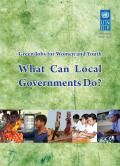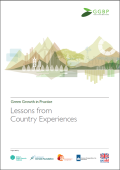- The relevance and effectiveness of green growth initiatives in South Asia;
- The current status of regional and national green growth strategies;
- Compatibility with traditional and emerging country growth models;
- Evidence on what works and what does not, and the knowledge gap;
- The challenges and opportunities that green growth poses for poverty reduction in the region; and
- The key institutions carrying out research on green growth in the region.

This paper presents examples of policies and programmes initiated by local governments that promote green jobs especially for women and youth. The aim is to inspire more local governments to consider policies that address the economic, social and environmental dimensions of sustainable development. The report includes case studies from South Africa, the Phillippines, Senegal, Bolivia, Argentina, Colombia, Bangladesh, Zimbabwe, Lesotho, Burundi and Viet Nam.
This report seeks to provide practitioners with the tools and information needed to respond to the public expenditure policy and management challenges arising from climate change. It is a series of notes and supporting materials written as a first step towards consolidating current research and international experience, identifying emerging practice and providing practical and applicable guidance for staff of central finance agencies, development agencies, environmental agencies and other international organizations working on climate change issues. In addition to emphasizing the importance of strengthening national systems throughout, the Sourcebook focuses on the specific public expenditure policy and management challenges posed by climate change, such as decision-making in the face of uncertain future climate conditions, expenditure planning for extreme weather and climate events, the lack of agreed budget definition and classification of climate change activities.
This publication suggests solutions that can be built into the design of urban development projects undertaken by the Asian Development Bank (ADB) to address the common problems and grievances of the urban poor, and to improve urban governance overall.
It also identifies successful or promising community-based approaches to dispute resolution that can be useful in urban project design.
It uses ADB's Governance policy as a framework for analyzing key findings of Access to Justice for the Urban Poor, a regional technical assistance grant to four developing member countries in Asia and the Pacific - Bangladesh, Indonesia, the Philippines, and Thailand. The findings consist of case studies illustrating typical problems encountered by the poor in connection with access to urban assets and services, and identifies the types of grievances or disputes that may arise because of these issues. The publication reproduces key case studies to illustrate significant concepts.

Green growth is becoming an attractive opportunity for countries around the world to achieve poverty reduction, environmental protection, resource efficiency and economic growth in an integrated way. Green growth strategies generate policies and programs that deliver these goals simultaneously. They accelerate investment in resource efficient technologies and new industries, while managing costs and risks to domestic taxpayers, businesses, communities and consumers.
This report carried out by the Green Growth Best Practice (GGBP) initiative, is the first comprehensive international assessment of lessons from experiences of pursuing green growth across all levels of government and all regions. The report is the result of a collaborative partnership between the Climate & Development Knowledge Network (CDKN), the European Climate Foundation (ECF) and the Global Green Growth Institute (GGGI). It engaged 75 authors in evaluating more than 60 programs around the world.
